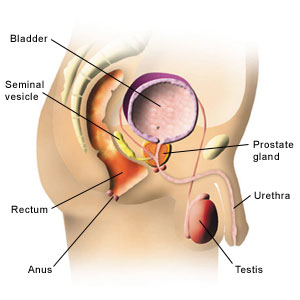One of the most alarming and shocking moments of my midlife bachelor existence occurred when I went in for an annual physical exam at age 38. I had not been in for a physical in many years – probably since my late twenties … and so I was under the perhaps naive impression the exam would simply consist of standard stuff like height, weight, blood pressure, breathing, looking down my throat and up my nose, etc. I thought that MAYBE the worst thing they would do was a test I vaguely recalled where the doctor would put his hands in the area around my genitals and tell me to “cough”. But I never expected what was really about to happen … a test for the health of my prostate … a test that none of my friends had ever told me about … a test known as the digital rectal exam.
What is the Prostate Gland?
The prostate gland is found only in men, and is located at the base of your bladder. Your urethra is the tube that transports urine from your bladder to your penis, and the urethra passes through your prostate gland. The prostate gland has several functions. It helps control urination since the prostate surrounds your urethra. The prostate also produces substances that are found in semen – such as minerals and sugar. In young men, the prostate is typically the size of a walnut. As we age, the prostate gland grows in size – a condition referred to as benign prostatic hypertrophy (BPH). When a prostate gland grows a bit too large, it can squeeze the blander and/or the urethra and cause symptoms like urination difficulty, urinary stream slowing, urinating more often, … all of those symptoms you see on some of the television commercials that say things like “gotta go … gotta go … gotta go”.

Why Have a Prostate Exam if I Have No Symptoms?
The main reason for doing a prostate exam on a midlife (or older) male is to detect early signs of prostate cancer. Prostate cancer symptoms are identical to those of an enlarged prostate … urination difficulty, stream slowing, going more often, having to get up in the middle of the night to urinate, pain when you urinate, blood in your urine, etc. Prostate cancer is a very slow-growing tumor on or within your prostate – and can take many years to become noticeable. Over time, the cancer can spread to surrounding tissues, or even throughout your entire body. The earlier prostate cancer is detected, the better your chances of survival – and the lesser your chances of having to go through more radical cancer treatments.



